 Your new post is loading...
 Your new post is loading...

|
Scooped by
Gust MEES
|

|
Scooped by
Gust MEES
|
“But we’ve always done it that way” is the comfortable, regular, and normal barrier to enacting change. And, our reluctance to change — in our personal and our professional lives — not only limits progress, it also prizes old ways of doing and being that, by design, were exclusive. When we rely on the ways we have always done it, likely we are also relying on our past efforts, and history on many fronts tells us that our past efforts weren’t the most inclusive or equitable. Learn more / En savoir plus / Mehr erfahren: https://gustmees.wordpress.com/2017/06/02/still-following-we-have-always-done-it-this-way-or-already-on-growth-mindset/

|
Scooped by
Gust MEES
|

|
Scooped by
Gust MEES
|
What would you say are a few of the biggest myths about growth mindset?
OK, myth No.1 is the myth that it’s all about effort, and that you instil it by praising effort. Effort is one factor that leads to learning. So the ultimate value is growth, progress, learning. And effort is one thing that leads there but there are many other things – strategies, using resources, getting advice, guidance and mentorship, and when people leave that out and just praise effort, it’s not transmitting a growth mindset. Adults have nagged children for centuries to try harder. That’s not a growth mindset, it’s an adult nagging a child to try harder!
Also, we find that when teachers think it’s just about effort and praising effort they may praise effort that isn’t even there, or that’s not effective. So if a child tries hard at something and you say ‘great job, you tried hard’, but they didn’t make progress, they didn’t advance, you’re actually conveying a fixed mindset because you’re saying ‘great effort, I didn’t really expect you to do that, and I don’t expect you to do that, so I’m trying to make you feel good about not doing it’. So we need people to understand that it’s appreciating a variety of process variables that lead to learning.
The second myth is that you can teach students a lesson on growth mindset and put a poster up in the front of the room, and that’s that, that they will have a growth mindset from then on. And we know if the teacher doesn’t then embody a growth mindset, if teachers don’t embody growth mindsets in their teaching practices, in the way that they give feedback when the child is stuck, and the way they present a new unit, in the way that they give opportunities for revision and growth of understanding – if they don’t embody that growth mindset, they are not teaching it. And in fact, if their behaviour contradicts the poster at the front of the room, then maybe they’re doing a disservice. Learn more / En savoir plus / Mehr erfahren: http://www.scoop.it/t/21st-century-learning-and-teaching/?&tag=carol+dweck http://www.scoop.it/t/21st-century-learning-and-teaching/?&tag=Growth+Mindset
It's important to recognize that a growth mindset is an overall paradigm for personal development rather than a pedagogical tool for measuring academic accomplishment. 5 Growth Mindset PracticesIn their groundbreaking book, Professional Learning Communities at Work, Richard DuFour and Robert Eaker say it clearly when pointing out the issue that comes about when change initiatives are considered "a task to complete rather than an ongoing process." If we really want to improve our schools, our work, and the education of our students, we can do so by adopting a new mindset -- for everyone -- that would include: - Being humble enough to accept that there are things about ourselves and our practices that can improve
- Becoming part of professional teams that value constructive critique instead of criticism
- Treating setbacks as formative struggles within the learning process instead of summative failures
- Realizing the restrictive role that timelines can play in reaching high standards, and using foundational philosophies such as Universal Design for Learning (UDL) to map systems so that everyone's growth is supported
- Create flexible grouping at all times so that nobody's trapped in any one course level or particular type of work.
Learn more / En savoir plus / Mehr erfahren: http://www.scoop.it/t/21st-century-learning-and-teaching/?&tag=Growth+Mindset
Via Ana Cristina Pratas, Miloš Bajčetić

|
Scooped by
Gust MEES
|
An idea that is beginning to gain a lot of favour in educational circles at the moment is the notion of fixed versus growth mindsets, and how they might relate to students and learning. Based on the work of Stanford University psychologist, Carol Dweck, the idea of mindset is related to our understanding of where ability comes from. It has recently been seized upon by educators as a tool to explore our knowledge of student achievement, and ways that such achievement might be improved. Learn more / En savoir plus / Mehr erfahren: http://www.scoop.it/t/21st-century-learning-and-teaching/?&tag=Growth+Mindset

|
Scooped by
Gust MEES
|
Pushing our students to adopt a growth mindset is an easy call. Adopting one ourselves is harder. Having a growth mindset doesn’t just mean learning about the theory and leaving it at that. It’s a constant process. Sometimes it’s difficult, often it’s a little painful, but it’s always worth the effort. Six Tips for Instilling a Growth Mindset in YourselfFocus on the hard stuff Try innovative solutions, and if they don’t work, try some more. Seek feedback wherever you can. Reflect at the end of every day, especially the bad ones. Notice the areas where you have a fixed mindset. There’s a catch to learning a lot about growth mindset. Once we learn just how much of our lack of growth is a product of our attitude, it’s not so easy to write things off as impossible anymore. Learn more / En savoir plus / Mehr erfahren: http://www.scoop.it/t/21st-century-learning-and-teaching/?tag=Growth+Mindset

|
Scooped by
Gust MEES
|

|
Scooped by
Gust MEES
|
A Checklist For Today's Teachers | #ModernEDU

|
Scooped by
Gust MEES
|

|
Scooped by
Gust MEES
|
What happens when someone asks us to do something really tough? First, we try to get out of it. Right? Next, we complain that they’re asking the impossible. Then, we whine to our friends, “I’m having such a bad day” or “The world is unfair.” After we’ve exhausted every way to get out of the work . . . we take a break. (It’s exhausting.) When we return, we brainstorm excuses to cover our behind if things go south. And, when all else fails, and it usually does, we get down to work while talking to ourselves.
Contrast this mindset to a champion’s approach . . .
I can hear the coach saying, “If they’re bigger, be faster” “If they’re better, play up.” “If you’re hurt, walk it off and then get back in the game.” There’s no whining, no excuses, and certainly no second-guessing. The players are positive, they’re optimistic, and they’re entirely focused on winning. These are the trademarks of winners. They’ll do whatever it takes to win. They know they have to “get it done.” Learn more / En savoir plus / Mehr erfahren: http://www.scoop.it/t/21st-century-learning-and-teaching/?tag=Frank+SONNENBERG http://www.scoop.it/t/21st-century-learning-and-teaching/?tag=Growth+Mindset

|
Scooped by
Gust MEES
|

|
Scooped by
Gust MEES
|
A recent interest of mine has been the Growth Mindset. I have blogged and presented on this topic: The Educator and the Growth Mindset The Educator with a Growth Mindset: A Staff Workshop Growth Mindset: Personal Accountability and Reflection How Educators Can Assist Learners in Developing a Growth Mindset Due to my interests, Carol Reiley contacted me about her…
Learn more:
http://www.scoop.it/t/21st-century-learning-and-teaching/?tag=Growth+Mindset
|

|
Scooped by
Gust MEES
|
Kids do crazy things, but we expect more from grown-ups, don’t we? Unfortunately, that’s not always the case. Folks scream obscenities at ballgames, bully people on social media, and treat others with total disrespect. If you think this behavior is rude, insensitive, and tasteless, you’re right. But why is it so prevalent? The truth is, some people behave this way for personal gain; some folks don’t know better; and others know they’ll get away with it — because they have in the past. Some grown-ups never grow up.
While some indiscretions were once considered outlandish, we’ve become desensitized to these actions. It’s troubling that some of this behavior could have been avoided, but too many of us didn’t speak up. Instead, we closed our eyes to the poor behavior and waited for others to make the first move. The consequence is that wrongs committed by enough people become the norm over time. We have no one to blame except ourselves.
As leaders, role models, and parents, we must utilize every opportunity to reinforce the values that we hold dear.
What Values Do You Cherish?
Are polite manners a thing of the past? Should people honor their word? Is it Pollyanna to expect people to do what’s right? I think not! But if we don’t promote good values, don’t be surprised when bad ones become the norm. “How do we improve the situation?” you ask.
First, we must modify our criterion of excellence. It’s not what you have but who you are that counts. Moral character matters! Learn more / En savoir plus / Mehr erfahren: https://www.scoop.it/t/21st-century-learning-and-teaching/?&tag=Frank+SONNENBERG http://www.scoop.it/t/21st-century-learning-and-teaching/?&tag=Character http://www.scoop.it/t/21st-century-learning-and-teaching/?q=ethics https://www.scoop.it/t/21st-century-learning-and-teaching/?tag=Values http://www.scoop.it/t/21st-century-learning-and-teaching/?tag=Growth+Mindset
August , 2017
In her celebrated book ‘Mindset: The New Psychology of Success’, Stanford university psychologist Carol S. Dweck makes a strong case backed up with scientific evidence for the power of mindset in shaping one’s success or failure in almost every facet of our life.Those with a fixed mindset mentality tend to be limited in their learning scope believing that their inner traits and abilities are biologically determined. On the other hand, people with a growth mindset embrace change and tend to learn more from life experiences because for them concepts such as skills, abilities and competencies are not fixated and can be developed through a process of error and trial.
In today’s post, we are sharing with you this handy infographic we created based on Marcus Guido’s post ’10 Ways Teachers Can Instill a Growth Mindset in Students’. Guido walks you through the different strategies you can use with your students to cultivate a growth mindset in your class and ultimately enhance students learning. Read his post to learn more about each of the strategies featured here.
The visual below is also available in PDF format from this link. Learn more / En savoir plus / Mehr erfahren: https://gustmees.wordpress.com/?s=growth+mindset https://gustmees.wordpress.com/?s=practice
Via Educatorstechnology

|
Scooped by
Gust MEES
|
STILL following "WE have ALWAYS done it this way" OR ALREADY on Growth-Mindset!? Well, when analyzing posts from EDUcators, TEACHers from around the world on Social-Media twitter since 2009 already, I must admit (excuse-me please...) that MOST of THEM are still on a Fixed-Mindset! Very rare are those who have already adapted their… Learn more / En savoir plus / Mehr erfahren: https://gustmees.wordpress.com/?s=growth+mindset https://gustmees.wordpress.com/?s=practice https://www.scoop.it/t/21st-century-learning-and-teaching/?&tag=Growth+Mindset

|
Scooped by
Gust MEES
|
Bigger issues: #1. Unfairness is necessary. Giving second chances, for example, isn’t fair to those who perform on schedule and within expectation. But, not giving second chances is cruel. #2. Fairness is merciless. Mercy is not getting what you deserve. In other words, mercy isn’t fair. #3. Equal opportunity must include reward or lack of reward. Those who seize opportunities earn reward. Those who don’t seize opportunities don’t earn reward. It’s important to note that it’s not necessary to punish those who don’t seize opportunity. Rewarding teams always includes some unfairness.
#4. Fairness – treating everyone the same – de-motivates high achievers and rewards low performers. #5. Fairness, when it means everyone is treated the same, promotes inaction. If you can’t be do something for everyone then you can’t do it for anyone. The result is you don’t do much. Learn more / En savoir plus / Mehr erfahren: http://www.scoop.it/t/21st-century-learning-and-teaching/?&tag=Counterfeit+Leadership http://www.scoop.it/t/21st-century-learning-and-teaching/?&tag=Growth+Mindset

|
Scooped by
Gust MEES
|
In science, we build a firm foundation and then we keep renovating the house. We find interesting results, we are fascinated by them, we don’t always trust them, so we go back and replicate them. We also challenge them by asking, where will this not work? When does the effect go away? How can we use better methods to test our theories?
As part of this process, scientists ask each other questions. Recently, other scientists asked us some questions about three of our papers. We took this very seriously, carefully considered each inquiry, delved into the studies again (in some cases reanalyzing the data), and prepared three documents, each detailing our process and our findings (here, here, and here). In each case, we showed that the conclusions reached in the paper were sound. But, as with anything that helps make science better, we were grateful for the questions because they pointed out areas for improvement or clarity, and because we believe in open science.
It is important however to consider these questions in light of a large body of work. The growth mindset story does not rest on a handful of isolated studies. Research in this area has been ongoing for 30 years and the field has amassed a large body of work. A meta-analysis published in 2013 found 113 studies conducted by many authors and concluded that mindsets are a significant factor in people’s self-regulation toward goals.
Meta-analyses are helpful, but not the final word. Government data collected at a country level—all the 10th grade students in the country of Chile (over 160,000)—showed that holding a growth mindset predicted academic achievement at every socioeconomic level. Recently, the state of California, collecting data from over 100,000 middle schoolers, found that students’ mindsets were a good predictor of their test scores. And this doesn’t include many experimental studies that have carefully oriented children (or adults) toward different mindsets and found effects on outcomes. It is highly unlikely that mindset is a phantom phenomenon. Learn more / En savoir plus / Mehr erfahren: http://www.scoop.it/t/21st-century-learning-and-teaching/?tag=carol+dweck

|
Scooped by
Gust MEES
|
False growth mindset is saying you have growth mindset when you don’t really have it or you don’t really understand [what it is]. It’s also false in the sense that nobody has a growth mindset in everything all the time. Everyone is a mixture of fixed and growth mindsets. You could have a predominant growth mindset in an area but there can still be things that trigger you into a fixed mindset trait. Something really challenging and outside your comfort zone can trigger it, or, if you encounter someone who is much better than you at something you pride yourself on, you can think “Oh, that person has ability, not me.” So I think we all, students and adults, have to look for our fixed-mindset triggers and understand when we are falling into that mindset.
I think a lot of what happened [with false growth mindset among educators] is that instead of taking this long and difficult journey, where you work on understanding your triggers, working with them, and over time being able to stay in a growth mindset more and more, many educators just said, “Oh yeah, I have a growth mindset” because either they know it’s the right mindset to have or they understood it in a way that made it seem easy. Learn more / En savoir plus / Mehr erfahren: http://www.scoop.it/t/21st-century-learning-and-teaching/?tag=Growth+Mindset https://gustmees.wordpress.com/2016/11/14/pssst-the-most-important-in-education-understanding/ https://gustmees.wordpress.com/2016/11/01/getting-ready-for-modern-education-first-try-to-understand-what-it-is/
Stop avoiding what scares you. You need to speak in public, but your knees buckle even before you reach the podium. You want to expand your network, but you’d rather swallow nails than make small talk with strangers. Speaking up in meetings would further your reputation at work, but you’re afraid of saying the wrong thing. Situations like these — ones that are important professionally, but personally terrifying — are, unfortunately, ubiquitous. An easy response to these situations is avoidance. Who wants to feel anxious when you don’t have to? But the problem, of course, is that these tasks aren’t just unpleasant; they’re also necessary. As we grow and learn in our jobs and in our careers, we’re constantly faced with situations where we need to adapt our behavior. It’s simply a reality of the world we work in today. And without the skill and courage to take the leap, we can miss out on important opportunities for advancement. How can we as professionals stop building our lives around avoiding these unpleasant, but professionally beneficial, tasks? Learn more / En savoir plus / Mehr erfahren: http://www.scoop.it/t/21st-century-learning-and-teaching/?tag=Growth+Mindset http://www.scoop.it/t/21st-century-learning-and-teaching/?tag=Comfort+Zone http://www.scoop.it/t/21st-century-learning-and-teaching/?tag=Character
Via Ariana Amorim, Kevin Watson, Mark E. Deschaine, PhD

|
Scooped by
Gust MEES
|

|
Scooped by
Gust MEES
|
I’ve compiled a list of statements offering new teachers advice as they enter their first year of teaching. It is my intention that these suggestions will dispel many of the myths pre-service teachers encounter as they complete their training programs. Don’t accept the DEFAULT, seek out an option that will be BETTER for students: - Make it your mission to fight “We’ve always done it this way” thinking.
- Be a disruptor and shake things up. Create an epic classroom!
- Start slowly with little tweaks like replacing rows of desks with clusters of four in all classrooms, especially those in middle school and high school.
- Create the change you wish to see in your school.
Be so GOOD they can’t ignore you:

|
Scooped by
Gust MEES
|
In the best guide I’ve found to learning this skill, “Thanks for the Feedback: The Science and Art of Receiving Feedback Well,” Douglas Stone and Sheila Heen of the Harvard Negotiation Project explain that feedback — both positive and negative — is challenging because it hits us in the vulnerable soft spot between our desire to grow and our deep need to be accepted and respected. The key to hearing feedback well, they argue, is to adopt what the psychologist and author Carol Dweck calls a “growth mindset.” People with a growth mindset believe that effort and challenge make us better, stronger and smarter, while those with a “fixed mindset” believe that our inherent assets are static no matter what we do.
Not all of the criticism kids face is constructive. Some of it is born out of ulterior motives or dark intentions, but the good news is that a growth mindset can protect kids from this sort of feedback as well. Learn more: - http://www.scoop.it/t/21st-century-learning-and-teaching/?tag=Growth+Mindset - http://www.scoop.it/t/21st-century-learning-and-teaching/?tag=Criticism

|
Scooped by
Gust MEES
|
An individual with a digital mindset understands the power of technology to democratize scale and speed up every form of interaction and action Growth Mindset Carol Dweck, in her research, differentiated between Fixed Mindset and Growth Mindset, and how these linked to people’s perception of their own abilities. Those with a fixed mindset believe that intelligence is static, and this can become an obstacle to change in behavior. This in turn makes it difficult for them to be learning agile or to adjust to a rapidly changing and ambiguous world. On the other hand, people with a growth mindset are likely to take every opportunity to pull the resources they need to perform better. They are usually the ones to volunteer information, ask questions and try out new ways of doing things. It cannot be argued that the digital world calls for constant exploration, experimentation and learning. And individuals with a growth mindset are more likely to put in extra effort to learn new things, take charge of their own learning, and possess a resilience that helps them to overcome challenges. Agile Approach Being agile is more than just adapting to change. In the age of disruptive tech, we must be able to foresee and change before the need to change arises. Agility in this context encompasses the skill of being able to scan the landscape of one's domain of work and organizational ecosystem, and keeping pace with what is happening at the edges to remain relevant. In the digital era, this would mean being comfortable with technology, seeing change as an opportunity, and accepting the new ways of working without feeling threatened.
|



 Your new post is loading...
Your new post is loading...










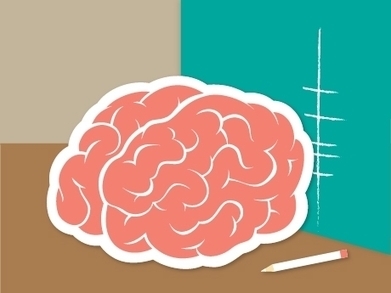


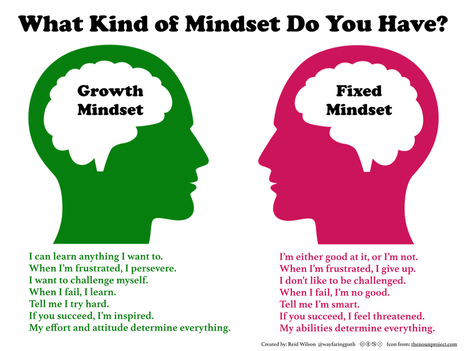




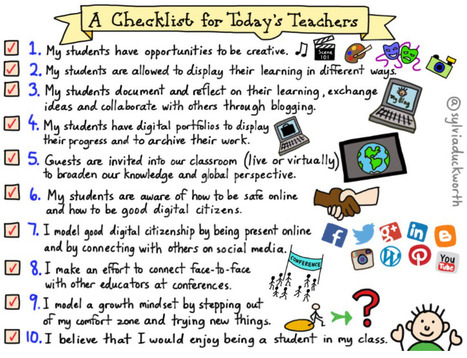



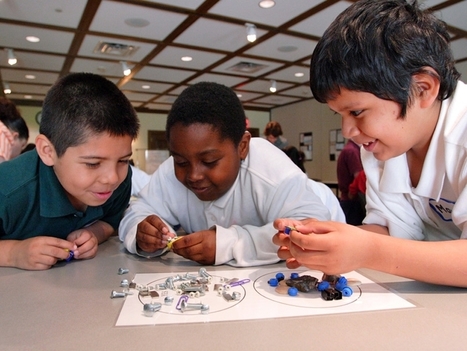

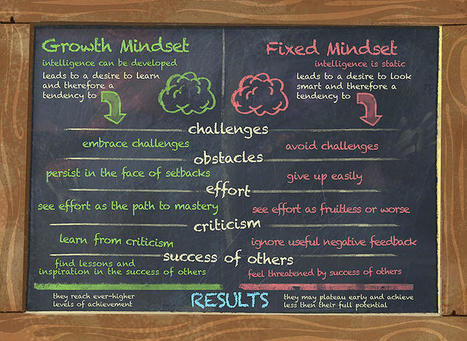






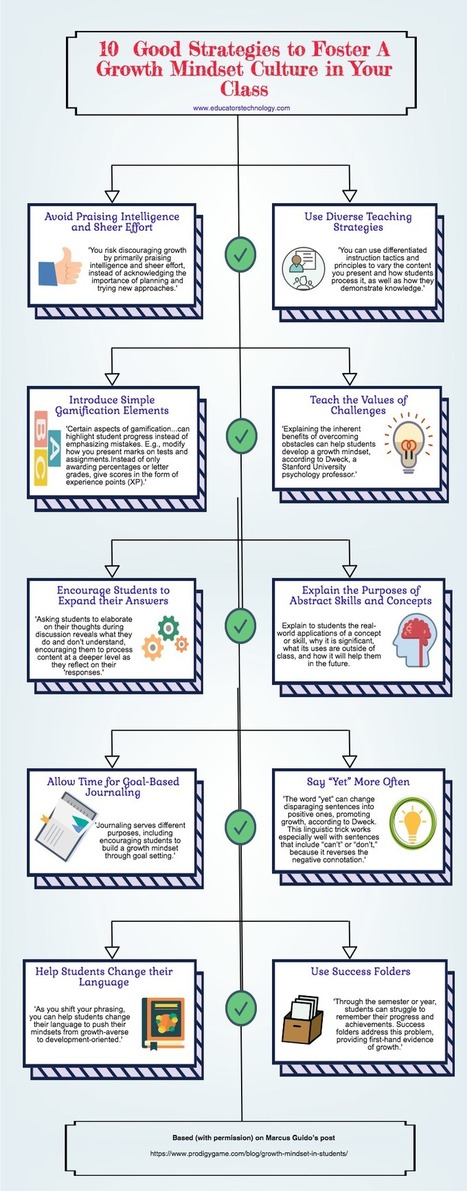

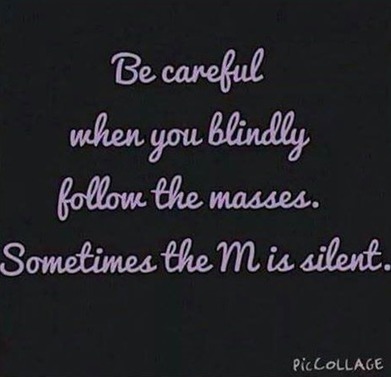

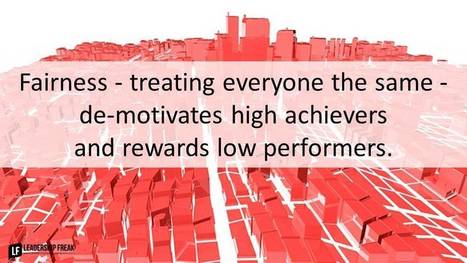


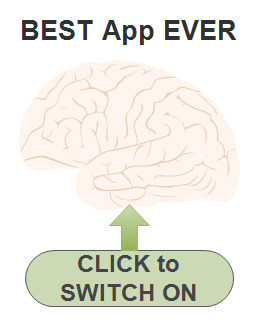





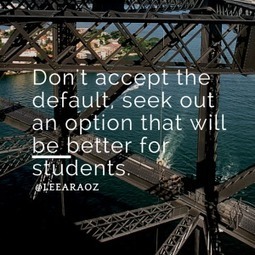










The World Economic Forum shared the Future of Jobs report in 2018 that provided a list of the growing skills for 2022. Here are the top 10:
- Analytical thinking and innovation
- Active learning and learning strategies
- Creativity, originality, and initiative
- Technology design and programming
- Critical thinking and analysis
- Complex problem-solving
- Leadership and social influence
- Emotional intelligence
- Reasoning, problem-solving, and ideation
- Systems analysis and evaluation
If we look at these 10 skill areas, what types of learning experiences or learning spaces can we create for our students that can address most if not all of them? Looking at these skills individually and thinking about the nature of our work, it can seem overwhelming. However, there are some simple ways to create a space where students can build all of these skills and more.
Here are six ideas to try that can help to address these skills:
1. Project-based Learning (PBL)
2. Coding
3. STEAM and Makerspaces
4. Place-based
5. Genius Hour
6. Student-Led PD or Teacher for a Day
Learn more / En savoir plus / Mehr erfahren:
https://www.scoop.it/t/21st-century-learning-and-teaching/?&tag=Grit
https://www.scoop.it/t/21st-century-learning-and-teaching/?&tag=Growth+Mindset
https://gustmees.wordpress.com/2015/05/13/andragogy-adult-teaching-how-to-teach-ict/
https://gustmees.wordpress.com/2017/08/25/adventures-of-learning-how-does-it-happen/
https://gustmees.wordpress.com/?s=life+long+learning